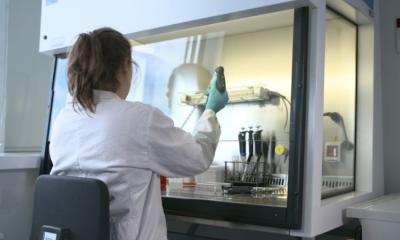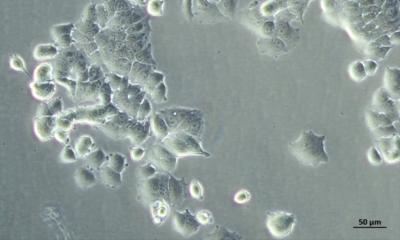Active substance
Promising treatment prospects for invasive breast cancer
Scientists from the University of Zurich have been able to understand for the first time why many cancer cells adapt relatively quickly to the treatment with therapeutic antibodies in invasive forms of breast cancer. Instead of dying off, they are merely rendered inactive. The researchers have now developed an active substance that kills the cancer cells very effectively without harming healthy cells.

In Switzerland alone, more than 5,700 women are diagnosed with breast cancer each year, and almost 1,400 of those affected die of the disease. In many very invasive forms of breast cancer, the cells have too much of the receptor HER2 on their surface. This leads to uncontrolled growth of the cells. Various antibodies such as trastuzumab and pertuzumab, which recognize the HER2 receptor, have been used in breast cancer therapy for many years now. However, these antibodies do not kill off the cancer cells. Instead, they render them dormant, and the cancer cells can become active again at any time.
Why breast cancer cells become resistant to antibody therapy
The team led by Andreas Plückthun, Director of the Department of Biochemistry at the University of Zurich, involving postdoc Rastik Tamaskovic and PhD student Martin Schwill, has now found out why these antibodies merely slow tumor growth rather than killing off the cancer cells. The receptor HER2 uses several signaling pathways at the same time to inform the cell that it should grow and divide. But the antibodies available thus far only block one of those signaling pathways, while the others remain active. The most important of these open paths leads through the central hub called RAS. “It is this protein that is responsible for reactivating the growth signal emitted by the HER2 receptor. The antibodies lose effect and the cancer cells continue to proliferate”. This is how Andreas Plückthun explains the mechanism, which has been understood in detail for the first time.
The UZH scientists have now discovered an astonishingly effective solution to switch off all signals emanating from HER2 in the cancer cells at the same time. They have designed a protein compound that binds itself simultaneously to two HER2 receptors in a targeted manner and changes their spatial structure. This “receptor bending” prevents any growth signals from being transmitted into the cell interior, and the cancer cells die off. Another advantage is the very selective effect of the substance, which ensures that the cancer cells are killed off efficiently but healthy body cells remain unharmed. For example, the innovative protein substance has caused the tumors in mice to regress without endangering the health of the animals.
Very effective protein compound soon to be tested on patients
The active ingredient comprises several DARPins (designed ankyrin repeat proteins). This new class of protein compounds that are easy to produce and have a large number of favorable binding properties was also invented and created in Plückthun’s biochemistry lab. A very similar substance is now being developed by Molecular Partners, a spin-off company of the University of Zurich. The aim is to test the first drug that functions according to this mechanism in patients as soon as possible in the course of clinical trials. Andreas Plückthun is optimistic: “Now that we have identified the Achilles heel of HER2-positive cancer cells, new opportunities are opening up for treating invasive tumor types like breast cancer more effectively in the future”.
Literature:
Rastislav Tamaskovic, Martin Schwill, Gabriela Nagy-Davidescu, Christian Jost, Dagmar C. Schaefer, Wouter P. R. Verdurmen, Jonas Schaefer, Annemarie Honegger, Andreas Plückthun. Intermolecular Trapping of ErbB2 Prevents Compensatory Activation of PI3K/AKT via RAS-p110 Crosstalk. Nature Communications. June 3, 2016. DOI: 10.1038/ncomms11672
Source: University of Zurich
10.06.2016











